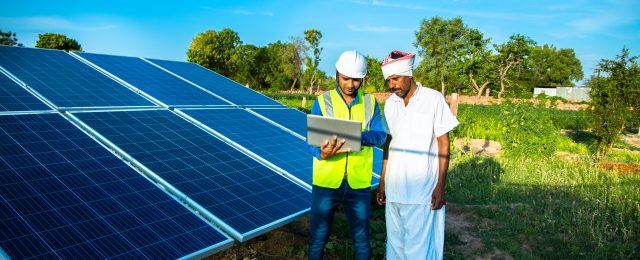How can we ensure that the energy transition is fair to all?

Redirecting financial flows to clean energy is critical, particularly in emerging and developing economies where these flows need to increase sevenfold to reach net-zero. But to be just, the energy transition must also not jeopardize the livelihoods of workers and communities dependent on fossil fuels.
This is where Just Energy Transition Partnerships (JETPs) come into play. JETPs are a new approach for providing climate finance to clean energy and just transition. A JETP of USD 15.5 billion has just been announced for Vietnam at the EU-ASEAN Summit with the potential to leapfrog the country’s renewable energy ambitions. Previous JETPs were announced for Indonesia at the G20 Leaders’ Summit and South Africa with an investment plan released at COP27 and future JETPs are expected for Senegal and India.
The aim of JETPs is three-fold. Sending a political signal to drive private investments in clean energy and away from fossil fuels, adopting a system-wide approach to climate finance that moves beyond project funding, and ensuring that the transition that unfolds is just. So far, the discussion has focused more on the first two elements, the financing terms of JETPs and the risks of seeing gas as a bridge fuel in the Global South. However, it is still unclear how these partnerships will deliver the just part of the bargain.
History shows us more successful just transition stories involve proactive planning. Planning itself can only work if there are clear standards and indicators to know what an effective just transition strategy is, how governments and companies can get there and what progress they are making over time. Several countries, including South Africa, did develop just transition plans, but very few, except for Scotland, have included just transition indicators in these plans. This in turn hinders progress from companies, as they lack the necessary guidance to understand how they can contribute to a just transition.
According to the 2021 Just Transition Assessment from the World Benchmarking Alliance (WBA), only about 1% of companies are planning for a just transition. WBA assessed 180 companies for electric utilities, oil and gas companies, and automotive manufacturers, and more recently for 90 transport companies as part of the 2022 Transport Benchmark.
In countries with JETPs, state-owned enterprises (SOEs) play an important role. Because SOEs are closely involved in the politics of their countries, a better understanding of how these companies will contribute to a just transition is needed. South Africa stands out as its power utility Eskom has a specific just transition office and its Treasury is considering a just transition taxonomy. India also recently developed a just transition division within its Ministry of Coal, but for now, its focus is on shutting down and repurposing older coal mines near their expiry. However, details about indicators are missing in both countries, and information is still lacking for Indonesia, Vietnam, and Senegal.
JETP negotiators should work with local companies, labour unions, workers, and other social partners to define these indicators. This is needed to provide access to reskilling opportunities and ensure clean energy jobs are decent in terms of pay, diversity, working conditions, and their level of social protection. Yet, data from WBA reveals that while a majority of companies do show how they intend to create green jobs, only 23% commit to reskilling and upskilling their workforce.
To achieve these goals, JETPs do not necessarily need to reinvent the wheel. India developed its Skills Council for Green jobs which spearheaded several training programs for renewable energy jobs across the country. South Africa’s Renewable Energy Independent Power Producer Procurement Programme stimulated private investments in various renewables and created jobs in the process, while its Renewable Energy Technology Centre (SARETEC) matches job creation with the skills needed for the industry. Similar opportunities exist or can be put in place in Indonesia, Vietnam and Senegal.
According to a recent study, in Vietnam renewable energy has the potential to create more than twice as many jobs than coal, but a skills development strategy to fully realize this potential is still missing. The key for JETPs will be to ensure renewable energy training programs exist, and when they do, to scale them up with additional funding and capacity building, while upholding just transition principles. Retraining opportunities will also need to be provided to fossil fuel workers who may not all benefit from renewable energy jobs.
Stakeholder engagement and social dialogue should also be crucial components of JETP negotiations, but details are still lacking on how this will take place. WBA data shows this remains neglected globally with only 11% of companies disclosing the types of stakeholders they engage with and 12% the steps they take to meaningfully engage with these groups. While some negotiations do need to happen behind closed doors, JETPs also need to be consultative and transparent to ensure a bottom-up approach that is not met with resistance from social partners. Civil society has been critical of the lack of involvement as part of South Africa’s JETP process. Similarly, in Vietnam the backlash against leading environmental activists puts into question how the transition will remain just as it unfolds. Ensuring consultation is embedded in future JETPs from the start will be indispensable to reaching the objectives of a just transition.
It cannot be assumed that just transition principles will be upheld by companies unless there are clear social criteria developed ahead of time by recipient and donor governments. In turn, these indicators will increase transparency and help companies better understand their just transition gaps and the actions they need to take in terms of planning, reskilling, social protection and stakeholder engagement. As JETP negotiations are still underway, now is the time to develop just transition indicators that will be critical to their success.